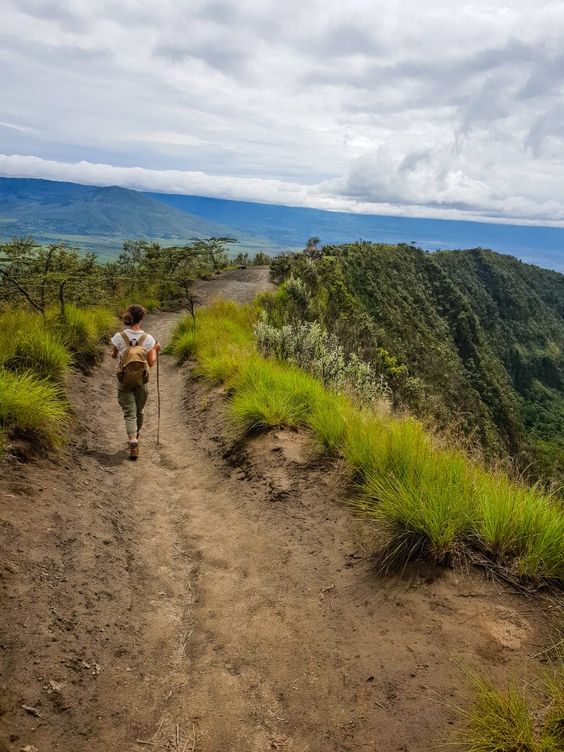Hiking in Kenya’s forests offers a unique experience filled with scenic beauty, diverse wildlife, and historical significance. From the tranquil trails of Karura Forest to the biodiversity-rich Kakamega Forest, these top hiking destinations provide a refreshing escape into nature, perfect for adventurers and nature lovers alike.
Introduction
Hiking in Kenya offers an unparalleled experience for nature lovers and adventurers alike. Known primarily for its breathtaking savannas, wildlife, and iconic national parks, Kenya also boasts some of the most enchanting forests that provide unique hiking experiences. Each forest has its allure, whether the thrill of exploring hidden waterfalls, spotting rare bird species, or simply walking under the cool canopy of indigenous trees. For hikers, these forests offer a blend of serenity, scenic views, and a chance to immerse oneself in the natural beauty of Kenya’s landscapes.
Whether you're an experienced hiker or a novice looking for a day out in nature, the forests in Kenya cater to all levels of fitness and interest. Some trails are short and manageable, while others offer an intense challenge that takes you deep into the wilderness. The thrill of adventure mixed with the calming atmosphere of dense forests makes hiking in these areas truly memorable. In this article, we’ll explore the top 5 forests for hiking in Kenya, each offering a unique experience. From the peaceful Karura Forest near Nairobi to the biodiversity hotspot of Kakamega Forest, let’s embark on a journey to discover these hidden gems.
1. Karura Forest: A Peaceful Escape in the Heart of Nairobi
Overview and Highlights Karura Forest, located just a few kilometers from Nairobi's bustling city center, is a true urban oasis. This forest is perfect for hikers who want to escape the city’s noise without traveling too far. The serene environment is packed with well-maintained trails, waterfalls, picnic sites, and even a lake, making it ideal for families, solo hikers, and tourists alike.
Hiking Trails and Features The trails in Karura Forest vary in length, ranging from 5 to 15 kilometers, allowing hikers to choose the route that suits their energy levels and time constraints. One of the most popular trails is the Olive Path, Sykes' Monkey, and KFEET Track, a 4.1-mile (6.6 km) loop that offers a moderate hike through scenic spots like bamboo groves and riverine forest areas. As you walk along these trails, you’ll encounter the picturesque Karura Waterfall, a highlight for many visitors, where you can stop for a peaceful break and snap a few photos.
What Makes Karura Special Karura Forest is more than just a hiking destination; it’s a sanctuary for wildlife and plants. Spotting sykes' monkeys or hearing the songs of exotic birds such as hornbills and sunbirds is common here. Karura is also a popular spot for history buffs, as it houses some significant historical sites like Mau Mau caves and war graves from Kenya’s colonial past.
2. Ragia Forest: Trekking Through History and Waterfalls
Overview and Highlights Ragia Forest is in central Kenya, within the expansive Aberdare Mountain Range. The forest is a hiker’s dream, offering both natural beauty and historical significance. One of its main attractions is the Mau Mau Caves, where freedom fighters used to hide during the struggle for independence.
Hiking Trails and Features The hiking circuit through Ragia Forest takes around 6–7 hours to complete and is filled with a wide variety of terrain. Starting at the Sasumua Dam, the trail leads you through dense forest paths, bamboo thickets, and past several waterfalls. The atmosphere is magical, with misty surroundings and the soothing sound of water flowing through the forest. If you’re lucky, you may even spot some of the forest’s wildlife, such as colobus monkeys or even elephants on the outskirts of the forest.
The Mau Mau Cave is an essential stop on this hike, adding a historical dimension to the natural beauty. It’s a reminder of Kenya’s resilience and the price paid for independence. Standing at the mouth of the cave, one can almost imagine the stories of the brave freedom fighters who once took refuge there.
What Makes Ragia Special What sets Ragia apart from other forests is the combination of natural and historical experiences. It's not just about trekking through beautiful landscapes but also about connecting with the rich history of Kenya. The numerous waterfalls you encounter along the way, such as the serene Chania Falls, are breathtaking and a true reward for making the journey through this enchanting forest.
3. Kakamega Forest National Reserve: A Biodiversity Hotspot
Overview and Highlights Kakamega Forest is a unique hiking destination because it’s the only remnant of the Guineo-Congolian rainforest in Kenya. This forest is a true haven for biodiversity, boasting over 400 species of birds, rare butterflies, and indigenous plant species that you won’t find anywhere else in the country.
Hiking Trails and Features The trails in Kakamega Forest vary in difficulty, from short nature walks to more challenging hikes that lead you deep into the heart of the forest. One of the most popular routes is the 6 km Isiukhu Trail, which takes you to the spectacular Isiukhu Falls. Along the way, you’ll be surrounded by towering trees, some over 100 years old, and you’ll have a chance to spot some of the forest’s most famous residents—blue monkeys, red-tailed monkeys, and a variety of bird species, including the Great Blue Turaco.
What Makes Kakamega Special Kakamega’s claim to fame is its incredible biodiversity. For nature lovers, birdwatchers, and anyone interested in ecology, this forest is a must-visit. The atmosphere is peaceful, with only the sounds of birds chirping and the rustle of leaves breaking the silence. The lush, dense canopy provides ample shade, making it a cool, refreshing hike even on hot days.
4. Arabuko-Sokoke Forest: A Coastal Paradise
Overview and Highlights Located near Kenya’s coastal town of Malindi, Arabuko-Sokoke Forest is one of the largest remaining coastal forests in East Africa. This forest is particularly important for conservation, as it protects some of the most endangered bird species in the region, as well as other rare wildlife.
Hiking Trails and Features Arabuko-Sokoke offers a range of trails that cater to different levels of hiking experience. The shorter nature trails are perfect for beginners or those with limited time, while the longer routes take you through various vegetation zones, from mixed forest to open woodland. One of the most rewarding hikes is the Sokoke Nature Trail, where you can spot the famous golden-rumped elephant shrew, a species unique to this forest. The cool, shady paths wind through dense forests, with the occasional break offering glimpses of open woodland and sandy patches.
What Makes Arabuko-Sokoke Special Arabuko-Sokoke is renowned for its birdlife, with over 270 species recorded in the forest. Birdwatchers flock to this area to catch a glimpse of the rare Clarke’s weaver, Sokoke scops owl, and the Amani sunbird. But it’s not just birds that make this forest special; you might also encounter forest elephants, bush babies, and butterflies fluttering through the undergrowth. This forest is a reminder of the diverse ecosystems that make Kenya so unique.
5. Ngong Road Forest Sanctuary: A Hidden Gem in Nairobi
Overview and Highlights Tucked away in Nairobi, the Ngong Road Forest Sanctuary is often overlooked by tourists, but it's a fantastic spot for hikers seeking a quick escape from the city. This forest, a remnant of the ancient Rift Valley forest system, offers a quiet retreat where you can enjoy the natural beauty and fresh air without traveling far.
Hiking Trails and Features The sanctuary has well-maintained trails that wind through the forest, providing a peaceful environment for walkers and runners. The trails range from 3 km to 10 km, making it perfect for all types of hikers. The lush greenery, indigenous trees, and the occasional glimpse of wildlife, such as bushbucks and monkeys, make this a delightful place to explore.
What Makes Ngong Road Forest Special The charm of Ngong Road Forest lies in its accessibility and tranquility. It’s less crowded than Karura Forest but equally scenic. The forest is also home to several community-led conservation projects, so by hiking here, you’re also supporting efforts to preserve Nairobi’s green spaces. It’s an excellent spot for anyone looking to experience a peaceful hike without leaving the city.
Honorable Mentions: Other Forests Worth Exploring in Kenya
While the top five forests listed above are some of the most popular hiking destinations, Kenya has plenty more to offer. Here are a few honorable mentions that are worth checking out:
- Kereita Forest: Located in the Aberdares, this forest is known for its zip-lining adventures and lush hiking trails. It's perfect for hikers seeking a mix of adventure and nature.
- Gatamaiyu Forest: A lesser-known gem near Nairobi with cool, misty trails and a serene atmosphere, Gatamaiyu Forest is perfect for those looking for an off-the-beaten-path hiking experience. The forest’s winding trails lead to small waterfalls and tranquil rivers, offering hikers a peaceful retreat.
- Kaya Kinondo Sacred Forest: Located along Kenya’s coast, this forest is not just a hiking destination but also a cultural treasure. The forest is sacred to the Mijikenda people, and visitors can learn about the forest's spiritual significance while exploring its beautiful trails. This blend of cultural heritage and nature makes Kaya Kinondo a unique place to visit.
- Sacred Mijikenda Kaya Forests: Similar to Kaya Kinondo, these forests are part of a UNESCO World Heritage Site, revered by the local Mijikenda communities. The forests are rich in biodiversity, and hiking here offers not only a natural experience but also a glimpse into the cultural traditions of the coastal tribes.
Conclusion: Kenya's Forests—A Hiker's Paradise
Hiking in Kenya offers more than just stunning landscapes; it provides an opportunity to connect with the country’s rich biodiversity, history, and culture. Whether you're navigating the tranquil trails of Karura Forest in Nairobi or trekking through the dense, biodiversity-rich Kakamega Forest, each destination has something unique to offer. Kenya’s forests serve as a reminder of the beauty and ecological importance of preserving natural spaces in a world increasingly dominated by urbanization.
From the coastal forests of Arabuko-Sokoke to the towering bamboo of Ragia, Kenya’s forests are as diverse as the country itself. Hikers will find varying levels of difficulty, ranging from easy nature trails to more demanding treks that take you deep into the heart of the wild. Additionally, these forests are home to rare and endangered species, making each hike not only a physical challenge but also a meaningful journey into the conservation of Kenya’s rich flora and fauna.
If you're a nature enthusiast, birdwatcher, or just looking for a peaceful escape from daily life, these forests offer something for everyone. So, grab your hiking boots, pack some water and snacks, and head out to explore the best forests Kenya has to offer!


























